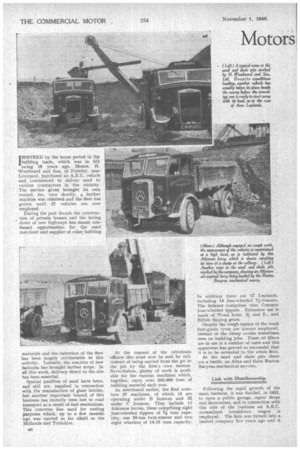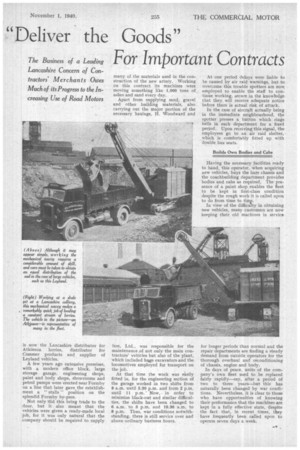Motors "Deliver the Goods"
Page 24

Page 25

If you've noticed an error in this article please click here to report it so we can fix it.
For Important Contracts INSPIRED by the boom period in the building trade, which was in full swing 18 years ago, Messrs. H. Woodward and Son, of Formby, near Liverpool, purchased an A.E.C. vehicle and commenced to deliver sand to various contractors in the vicinity. The service given brought its own reward, for, very shortly, a further machine was obtained and the fleet has grown until 37 vehicles are now employed.
During the past decade the construction of private houses and the laying down of new highways has meant continued opportunities for the sand merchant and supplier of other building materials and the extension of the fleet has been largely attributable to this activity. Latterly, the erection of new factories has brought further scope. In all this work, delivery direct to the site has been essential.
Special qualities of sand have been, and still are, supplied in connection with the manufacture of glass bottles, but another important branch of this business has recently been lost to road transport as a result of fuel restrictions. This concerns fine sand for casting purposes which, up to a few months ago was carried as far afield as the Midlands and Yorkshire.
At the request of the petroleum officers this must now be sent by rail, instead of being carried from the pit to the job by the firm's own motors. Nevertheless, plenty of work is available for the various machines which, together, carry over 250,000 tons of building material each year.
As mentioned earlier, the fleet numbers 37 machines, of which 15 are operating under B licences and 22 under C licences. They include 11 Atkinson lorries, these comprising eight four-wheeled tippers of 7i tons capacity, one 10-ton twin-steerer and two eight wheelers of 14-15 tons capacity. Tn addition there are 17 Laylands, including 14 four-wheeled 7i-tonners. The balance comprises nine Commer four-wheeled tippers. Extensive use is made of Wood hoist, B, and E., and Edbro tipping gears.
Despite the rough nature of the work first-grade tyres are always employed, instead of the cheap covers sometimes seen on building jobs. Fram oil filters are in use in a number of cases and this apparatus has proved so successful that it is to be extended to the whole fleet.
At the sand and shale pits there are a Smith, an Allan and three Ruston Bucyrus mechanical navvies.
Link with Distributorship
Following the rapid growth of the main business, it was decided, in 1932, to open a public garage, repair shops and showrooms, and in connection with this side of the business an A.E.C. streamlined breakdown wagon is employed. The firm was turned into a. limited company five years ago and it
is now the Lancashire distributor for Atkinson lorries, distributor for Commer products and supplier of Leyland vehicles.
A few years ago extensive premises, with a modern office block, large storage garage, engineering shops, paint and body shops, showrooms and petrol pumps were erected near Formby on a line that later gave the establishment a " stalls " position on the splendid Formby by-pass.
Not only -did this bring trade to the door, but it also meant that the vehicles were given a ready-made local job, for it was only natural that the company should be required to supply
many of the materials used in the construction of the new artery. Working on this contract its machines were moving something like 1,000 tons of ashes and sand every day.
Apart from supplying sand, gravel and other building materials, also carrying out the major portion of the necessary haulage, H. Woodward and Son, Ltd., was responsible for the maintenance of not only the main contractors' vehicles but also of the plant, which included huge excavators and the locomotives employed for transport on the job.
At that time the work was easily fitted in, for the engineering section of the garage worked in two shifts from 8 a.m. until 5.30 p.m. and from 2 p.m. until 11 p.m." Now,. in order to minimize black-out and similar difficulties, the shifts have been changed to 6 a.m. to 3 p.m, and 10.30 a.m. to 8 p.m, Thus, war conditions notwithstanding, there is still service over and above ordinary business hours. At one period delays were liable to be caused by air raid warnings, but to overcome this trouble spotters are now employed to enable the staff to continue working, secure in the knowledge that they will receive adequate notice before there is actual risk of attack.
In the case of aircraft actually being in the immediate neighbourhood, the spotter presses a button which rings bells in each department for a fixed period. Upon receiving this signal, the employees go to an air raid shelter, which is comfortably fitted up with double bus seats.
Having the necessary facilities ready to hand, this operator, when acquiring new vehicles, buys the bare chassis and the coachbuilding department provides bodies and cabs as required. The presence of a paint shop enables the fleet to be kept in first-class condition despite the rough work it is called upon to do from time to time.
In view of the difficulty in obtaining new vehicles, many customers are now keeping their old machines in service for longer periods than normal and the repair departments are finding a steady demand from outside operators for the thorough overhaul and reconditioning of Chassis, engine and body.
In days of peace, units of the cornpany's own fleet used to be replaced fairly rapidly—say, after a period of two to three years—but this has naturally been changed by war conditions. Nevertheless, it is clear to those who have opportunities of knowing their performance that the machines are kept in a fully effective state, despite the fact that, in recent times; they have frequently been called upon to operate seven days a week.




















































